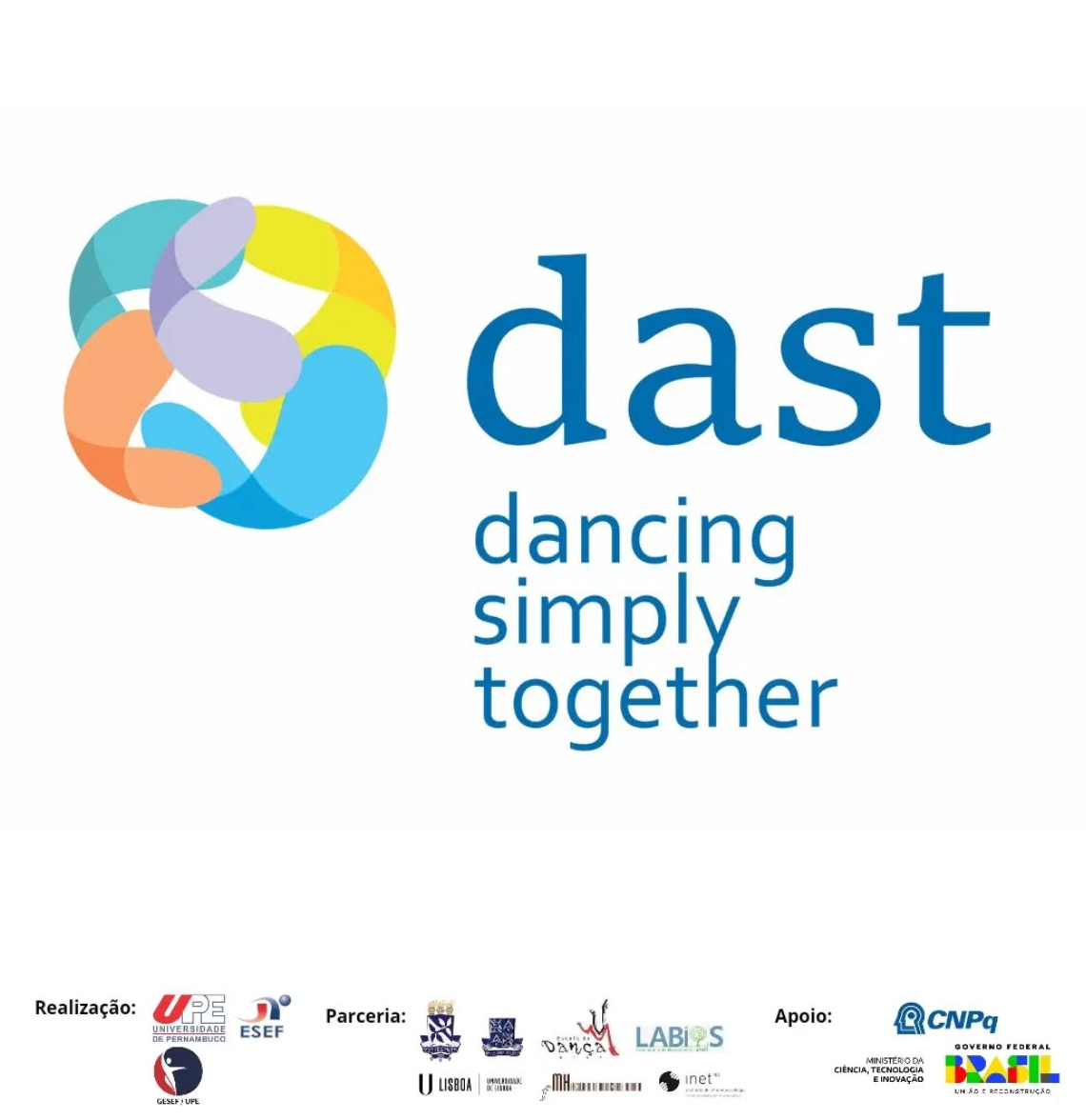

International Seminar | Collective Compositions in Dance: Dancing Images, Creative Voices 21 and 22 October 2025 | Recife, Brazil
The International Seminar Collective Compositions in Dance (CCD) offers a space for encounter and dissemination of the DAST project, dedicated to collective practices in dance mediated by digital technologies, focusing on transformations in the perception of the body, presence, and being-in-common.
The initiative aims to bring together artist-researchers and students, particularly postgraduate students, whose work traverses the fields of dance, performance, social intervention, and collaborative creation, reflecting on the challenges and possibilities of expanded bodies.
The international seminar is organized in partnership between the Extension Programme Saberes Diversos and the DAST Research Project. The Saberes Diversos Programme (www.saberesdiversos.com.br, @saberesdiversosupe) operates in the field of culture, valuing diverse forms of knowledge. Developed by lecturers and students from several campuses of the University of Pernambuco, it is funded by the Proec PFA call.
Key dates:
- 24 September 2025 – Deadline for abstract submission
- 8 October 2025 – Notification of acceptance
- 15 October 2025 – Registration and payment (UPE)
- 21–22 October 2025 – Event (hybrid format; remote presentation possible)
More information and submissions: DAST project website
Dancing Simply Together (DAST): Exploring the connections and flow between dance and complexity (2022–2025)
DAST investigates relations and the production of differences (Deleuze, 2018) within dance in contemporary societies, which are deeply marked by the relations between humans and non-humans, increasingly producing similarities.
Currently, dance creation processes based on organizational principles (Leste, 2010) foster conditions to explore the multiplicity of bodies in a collective, informed by complex systems and the sense of togetherness (Tseng et al., 2021). In dance production and education, there is growing interest in improvisation with trained and non-trained populations in contexts that intersect with art, education, health, and leisure.
Research on neural processes in dance points to the development of a field called neuroaesthetics (Zeki et al., 2020). This project seeks to question the relations between processes of dance creation and education with different populations in the fields of art, health, leisure, and education, from the perspective of dynamic functional brain networks understood as complex systems that co-produce dancing bodies and societies potentially committed to producing differences.
Our working hypothesis focuses on the creation and implementation of dance creation and teaching procedures based on improvisation, in both live and virtual environments, with and without the evaluation of functional brain networks, within the production of dances using Agent Based Models (Chaudhry, 2016). These are understood as complex systems pointing toward an ethics of encounter and a politics of co-production, generating dances, aesthetics, and poetics that are self-organized – a generative dance.
The study adopts a mixed-methods, transformative strategy with concurrent triangulation (Creswell, 2007). Thus, DAST arises from the need to expand academic discussion for a better ethical and political understanding of generative dance and to deepen the study of functional connectivity dynamics in collective dance.
Partner Institutions: University of Pernambuco / School of Physical Education – UPE-PE, Brazil; Federal University of Bahia / School of Dance – UFBA-BA, Brazil; Federal University of Bahia / Department of Nuclear Geophysics – UFBA-BA, Brazil; University of Lisbon / Faculty of Human Kinetics / INET-md, Portugal
SDG 3 – Good Health and Well-being
SDG 4 – Quality Education
SDG 5 – Gender Equality
SDG 10 – Reduced Inequalities
SDG 11 – Sustainable Cities and Communities
SDG 17 – Partnerships for the Goals
Thematic Line: Performatividades Digitais e Tecnológicas
The DAST project has been under development since February 2023 through a partnership between researchers from the University of Pernambuco, the Federal University of Bahia, and the University of Lisbon, and is funded by CNPq (Pró-Humanidades/2022 call), with additional support from FCT within the INET-md 2020–2024 Multiannual Funding UIDB/00472/2020 and the FCT PhD grant 2021.07216.BD.

